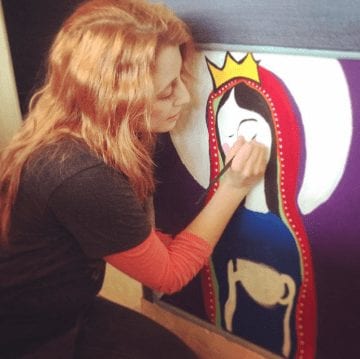
A café owner explains how she went about setting expectations and communicating fairly in order to manage people in her age group.
BY MEREDITH ELSTON
SPECIAL TO BARISTA MAGAZINE ONLINE
Photos courtesy of Meredith Elston

The above photo is me at 27, the first year I opened Maeva’s Coffee in Alton, Ill. I’d done months of build-out and was ready to go, but I had zero leadership experience to rely on.
The people I hired? All awesome young coffee enthusiasts, most of them within five years of my age. Managing people my age was the last thing on my mind. At a glance, it seemed simple—I thought, “Of course everyone will work together. Everyone is a responsible adult!” The reality was far different.
It only took a few weeks for frustration to set in. Why wasn’t everyone pulling their weight? Cleaning toilets? Stocking paper cups? Did no one else seriously see that the milk fridge was out of heavy cream?
It all came to a head one day when my lead barista, a guy listed as part of our team in our business plan, balked at my suggestion of having to-do lists for the staff. “I thought you were trying to start a different type of coffee shop. That seems so … corporate,” he told me. That stung. Is there a worse insult in the indie coffee business than being called “corporate”? Age, it turns out, has little to do with quality of work. But it does make management tricky.
At the start of our business, I was working on-shift 50+ hours a week, and pulling more behind the scenes. If you run a shop, you’ve felt it. You don’t have time to nag and plead. You are too busy!

I knew I had to come up with a solution, and fast. Some of the staff was starting to resent those who didn’t pull their weight. The people who weren’t pulling their weight rolled their eyes and told me to chill. I didn’t want to fire anyone because, well, technically they weren’t doing anything wrong! How could I expect them to just do what they were “supposed to” without communicating it? The tension was thick. I needed a solution that was easy to follow and, above all else, fair for everyone.
As it turns out, the solution was good old-fashioned list-making.
Why I Fell in Love with Lists
I guarantee you’ve never seen anyone as nervous as I was when I brought those cleaning lists to the first staff meeting, but they worked. Think about it. It’s so simple. A list took the pressure off of me because I wasn’t singling anyone out. It took the pressure off the staff because they weren’t trying to guess what I wanted them to do. They had a list, and once the task was done, they could check it off. This created one of two results:
People did the work better. Some people just needed a little guidance to keep them on track. The list provided guidance without a direct hand—something that can be hard when your staff sees you as more of a friend their own age than a person in charge.
People adjusted bad habits. No one wants to sign their name to bad work. By using the list I leveled the playing field, making everyone as responsible as the last person.
After that meeting, over half the staff came to me to tell me how relieved they were to have a cleaning schedule. But better yet, the pressure was off. Things were cleaned and stocked. Cleaning lists became just a small part of what unlocked a much bigger view on successfully managing people my own age.

From this experience, I realized that what my staff needed was better communication. They needed me to take the guesswork out of things by setting expectations up front. As a business owner, I needed benchmarks that I could set and fairly address if something fell short.
It’s pretty unglamorous to talk about cleaning lists in a world of pretty latte art pours and single-origin ’spros. But if the day-to-day stuff isn’t getting done, your staff isn’t going to have the energy to put as much quality into to the coffee your customers love.
My suggestion: Try assigning some lists to your staff. If it doesn’t work, that’s fine! Every business runs on its own best design. With that said, I imagine you’ll see an immediate increase in quality, cleanliness, and care by month’s end!

ABOUT THE AUTHOR
Meredith Elston has run a profitable, productive, and well-loved neighborhood coffee shop outside of St. Louis since 2014. When she’s not pouring behind the machine, she’s helping other female entrepreneurs start their own businesses inside The Milton Schoolhouse business incubator.

